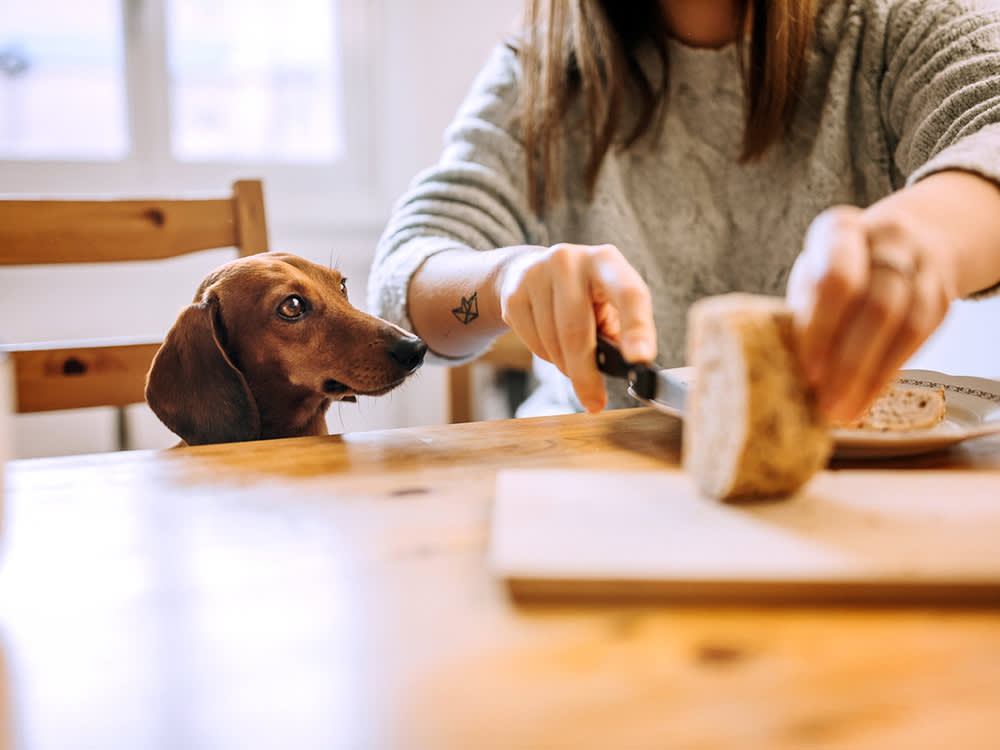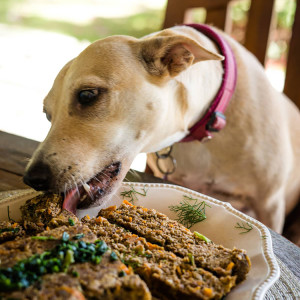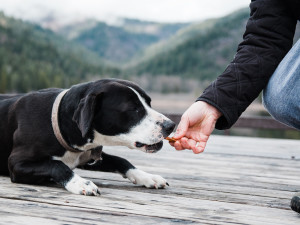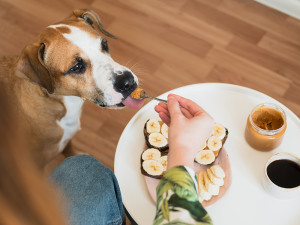Can Dogs Eat Bread?
The short answer: yes — in moderation. It’s better to go easy on this carb-heavy treat.

Share Article
Bread baking is a trend (ahem) rising in kitchens everywhere, so if you’ve attempted making a loaf from scratch during the last few years, you aren’t alone. Approximately 30 percent of people reported trying out baking skills during the height of the shutdown — and once you’ve tasted fresh homemade bread, it’s hard to go back to the old stuff. If your pup’s been salivating by the oven while you embrace your new hobby, you might be wondering whether or not there’s any harm in sharing a slice. Here’s a look at the pros and cons of bread for dogs, plus a recipe to try making your own dog-safe bread at home.
Nutrition facts: Bread for dogs
Is bread good for dogs?
Different types of bread might impact your dog differently.
Whole wheat: Whole wheat bread has a higher nutritional value than white bread, with fewer calories and more vitamin B6, magnesium, and iron. And whole wheat bread is not only better for your pup, but the higher fiber in whole wheat bread can aid in relieving constipation.
Rye: Rye bread is a denser whole-grain bread that contains less gluten than wheat bread. As an occasional treat for your dog, it’s a healthier choice — as long as it’s whole grain. Keep an eye out on the label to ensure you’re getting the healthy stuff. Rye has more fiber than wheat and is known to be more effective at treating constipation.
Cornbread: Dogs can also eat cornbread, a non-yeast bread that’s a good source of phosphorus. As an occasional treat, cornbread is safe for dogs. But cornbread is high in carbs, sodium, and sugar, and lacks the benefits of other whole-grain bread.
If your pup has allergies, gluten intolerance, or a sensitive stomach, bread might not be a good choice for them. Each dog is an individual, so if you’re unsure, it’s better to check with a pro. “Before feeding your pet any human foods, remember to always check with your veterinarian or a veterinary nutritionist. Every pet is different so what may be okay for one may not be okay for another,” says Dr. Lindsey E. Bullen, a board certified veterinary nutritionist at BluePearl Specialty and Emergency Pet Hospital. “It is also important to keep pets with chronic illnesses or diseases on their prescribed diet, as any deviation could result in sickness and a trip to the ER.”
Can dogs eat bread?
Dogs can eat bread, but this carb-heavy treat should be shared in moderation and only after you’ve checked the ingredients first. While feeding your pup plain white bread as an occasional treat is perfectly safe, that doesn’t mean it’s healthy. Bread is low in fat and high in carbs and offers few nutritional benefits. Carbohydrates — broken down by the body into sugar — turn into fat if unused, which isn’t ideal for keeping extra pounds off your pup. Depending on the type of bread, it can provide some light dietary benefits. Whole-grain wheat, sourdough, and rye offer additional nutritional benefits for dogs and make great alternatives to white bread.

Is bread completely safe for dogs?
For a healthy dog without allergies or a gluten intolerance, bread isn’t all bad. But not all bread is created equal. Some ingredients in certain types of bread aren’t suitable for any dog — and they can be downright dangerous. Here are types of bread (and toxic ingredients) to watch out for in order to keep your dog safe.
Raisin bread: Can dogs eat raisin bread? This is a definite no. Raisins (and their juicy counterparts, grapes) are toxic to dogs. Raisins can cause kidney failure, which makes them extremely harmful to dogs, so keep loaves containing raisins stored safely in areas where your dog can’t reach them.
Banana bread: Dogs shouldn’t eat most banana bread. Bananas are perfectly safe for dogs; in fact, they’re a pretty healthy treat with plenty of nutritional benefits. But banana bread is often baked with nuts like macadamia nuts or walnuts, which should not be given to dogs — they’re both a choking hazard and potentially toxic. Excess sugars in sweet breads like banana bread aren’t doing your dog any favors either, so it’s best to skip this one.
Garlic bread: Like raisins and macadamia nuts, garlic is a no-no for dogs, which, by extension, makes garlic bread bad for dogs. Garlic and other allium plants, like onions, are toxic to dogs and cause stomach aches, vomiting, and diarrhea. In high quantities, garlic can also cause hemolytic anemia.
Gingerbread: While a bite or two of gingerbread is unlikely to harm your dog, it does contain another toxic ingredient: nutmeg. A component of nutmeg called myristicin is toxic to dogs in large quantities. Myristicin toxicity can cause stomach upset, high blood pressure, increased heart rates, and hallucinations. Because of the potential for toxicity, it’s best to keep gingerbread away from your dog.
Watch out for extra ingredients like chocolate and xylitol (a sugar substitute), which are both toxic to dogs. Breads high in sugars or fats can cause stomach irritation in some dogs or, worse, cause pancreatitis. Then there’s raw bread dough which is dangerous for dogs. Uncooked yeast dough can expand in a dog’s stomach, causing obstruction and alcohol poisoning. “The real danger is from the resulting alcohol toxicosis which causes depressed central nervous system, weakness, an unsteady, drunken gait, hypothermia, seizures, and coma,” says Dr. Bullen.
Other foods that are good for dogs
Yogurt: Yogurt is safe and healthy for dogs, and most dogs love itopens in new tab.
Popsicles: If you make a dog-friendly popsicleopens in new tab, then it certainly can be good for your dog.
Cherries: Not only are cherries sweet and deliciousopens in new tab, but they also contain many important nutrients that can benefit your dog.
Other foods that are not good for dogs
Ritz crackers: While a stray Ritz crackeropens in new tab won’t hurt your dog, they’re certainly not healthy for your pup.
Tortilla chips: The amount of sodium found in your average tortilla chipopens in new tab make them a less than ideal snack for dogs.
Garlic bread: You should never feed garlic bread to your pup—garlic is toxic for dogsopens in new tab.
References

Daniela Lopez
Daniela Lopez is a digital media specialist and long-time contributor to The Bark.
Related articles
![Pixie the dog sitting at a wooden table taking a bite of some delicious vegetable meatloaf]()
How to Cook a Wholesome Meatloaf For Your Dog
This dog-friendly recipe is so not your mom’s meatloaf — which is a good thing.
![A dog taking a bite of a treat out of a persons hand with beautiful mountains in the background.]()
Homemade Chicken Jerky Dog Treats
The benefits of making chicken treats for your pup at home.
![View over the shoulder of a women eating peanut butter and bananas and feeding some of the peanut butter to her dog on a spoon]()
Can Dogs Eat Peanut Butter?
Elvis famously loved peanut butter. So, can your “Hound dog” lap it up, too?



